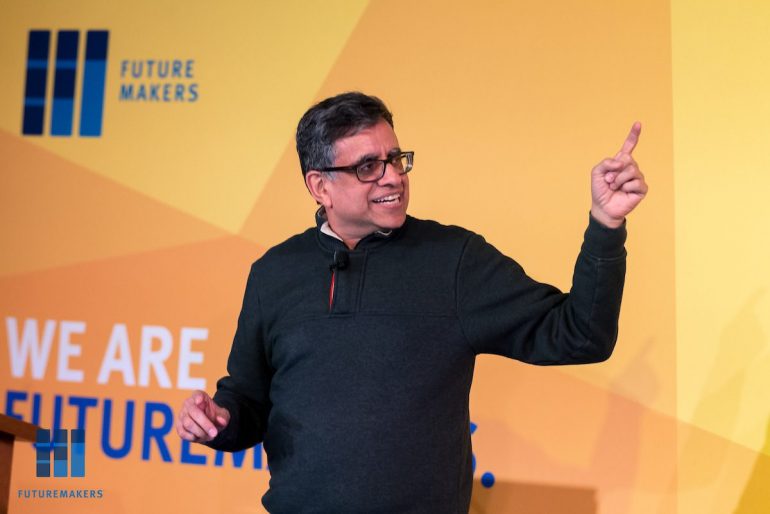On a Toronto night dubbed “Snowmageddon” by more than a few tweeting attendees, RBC hosted the February edition of FutureMakers Talks with the theme of APIs (application program interfaces) and creating community through ecosystems. Presenting APIs as the “tech connector” that brings systems together, the topic was fitting for a night that featured a room full of eager learners clustered together despite the weather.
The evening began with charismatic keynote speaker Anant Jhingran, the CTO of Apigee and Leader of Products for API Management at Google, who explained how businesses can scale with API-driven ecosystems.
Invest in good chopsticks
“Software is eating the world, and APIs are the chopsticks,” said Jhingran, before noting that APIs allow independent businesses to come together for common good – so being the “chopsticks” can definitely be a positive.
“Ecosystems, in general, are just partnerships that enable other people to work with you in cooperation, so that together, you can lift the boat.”
As Jhingran noted in his presentation, the key to external API success is to build them in ways that leverage your company’s services to bring demand and help grow your business. Jhingran gave the example of American pharmacy chain Walgreens: the store provided APIs to allow iOS developers to include photo printing capabilities for customers, resulting in six times more business for Walgreens through additional purchases when these customers came in to pick up their photos.

Jhingran reinforced this point through a live ecosystem simulation, demonstrating that even the slightest change in variables – like a delay in bringing a product to market – can create an advantage for one business, leaving another lagging behind. Jhingran urged the room to “act with a sense of urgency if you believe ecosystems are important” and leverage your connections in order to get ahead. Although he did warn the audience that “even if you play the rules perfectly, you may end up losing.”
To give your ecosystem a leg up in the game, Jhingran emphasized the need to invest in developers in order to succeed. “If you invest in developers, you can connect to various ecosystems and bring demand to your services,” he said.
In a shocking stat, Jhingran noted that less than 50 percent of Fortune 500 companies have a developer-facing property, but 94 percent of the largest web properties not only have developer-facing properties, they offer open APIs. It was no surprise, then, that one of his Three Golden Rules was to Spend On Developers (Speed and Specialization were the other two). Those who do – and those who create an environment for developers to work with their APIs – are the ones that will get ahead the fastest.
“It doesn’t matter if you’re a lion or a gazelle, when you wake up in the morning, you better start running” – @jhingran emphasizing competition within API ecosystems #FutureMakers
— Sarah Dinn (@SarahDinn_) February 28, 2019
The next speaker was Bob Blainey, VP P&CB Architecture and Platform Engineering at RBC, who gave a talk on how internal APIs are being leveraged in order to reimagine banking architecture. As Anant Jhingran briefly noted in his talk, financial institutions are one of the prime candidates for API usage, as allowing customers more options can help banks get ahead in the market.
The challenge, however, is that financial software is made in what Blainey referred to as “a highly constrained environment” due to security and regulation needs. Blainey noted that the needs of a “microservice model,” where each different function of a financial institution is broken down into a collection of loosely coupled individual services, can add development cycles as teams ensure that customer and financial data is protected. Developers also want to ensure that their banking APIs feature a strict separation of interface and implementation so work can be done behind the scenes without service interruption.
“The prime directive right now is, how do you compress the cycle?” he said. “Investing in environment, how can we solve these problems? How can we have better security?”
@#RBC with Bob Blainey: design microservices through enterprise wide and longterm API strategies #customercentric. Need to break down work and have smaller yet broader teams for enhanced collaboration & speedy ideation/learning #futureofwork#buildforthefuture#FutureMakers pic.twitter.com/Wujrd5Gspw
— Hillel (@bierhill) February 28, 2019
Versioning complex components doesn’t have to be… complex
Following Blainey was Rebecca Putinski, a staff software developer at Pivotal, who demonstrated in detail some of the problems developers must solve when working with APIs. Putinski explained how to version complex components in open source software.
Putinski’s first goal for versioning was “don’t break anything!” followed by other important tips such as creating straightforward implementation and making it easy for others to adopt your software by using upgrading components.
Even when following these steps, Putinski noted there will still be challenges. Backwards compatibility issues can come up often, with APIs being upgraded at varying rates and ongoing battles with the “upgrade-averse” within the open source community.

By the end of her talk, Putinski had walked the room through the lines of technical code for a CPI API update to successfully create a new version 2, before providing one final tip for developers in the audience.
“Because all of these components are not within the same company or the same key,” Putinski said, “you obviously have to communicate.”
The final speaker of the night was RBC’s Dr. Fatima Hussain, a security analyst who discussed the security challenges with smart APIs, and the role of the GDPR (General Data Protection Regulation) in data protection. Hussain provided the room with an overview of traditional digital security models, which are based on access control through key authentication and tokens. AI-driven API security, however, is created via “deep analysis and insights” about API login attacks and data attacks.
Looking to join in on the conversation at the next edition of FutureMakers Talks? Tickets for the next event on March 27 range from $7-15, but BetaKit readers can get in FREE using the promo code “BetaKitPROMO”.
BetaKit is a FutureMakers media partner. Photos by Mirna Chacin.


